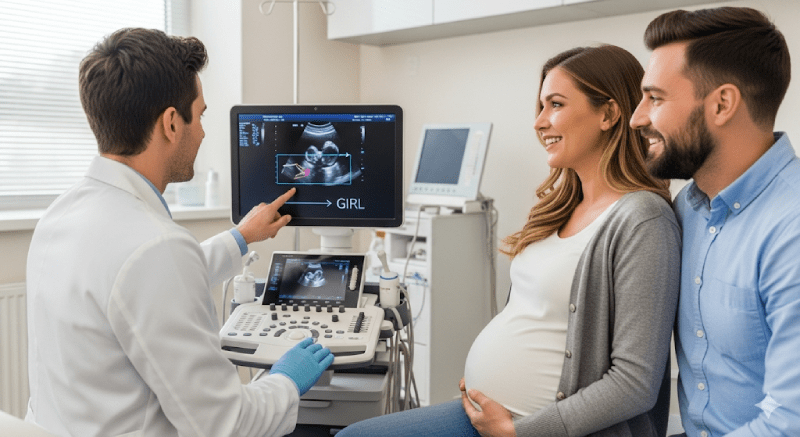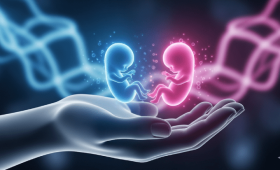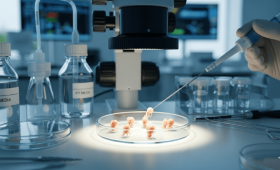In vitro fertilization (IVF) is a significant source of hope for couples who wish to have children. This process can be complex, both medically and emotionally. Here are detailed answers to the most frequently asked questions about IVF.
What is IVF and How Does It Work?
IVF is an assisted reproductive technology that involves the fertilization of female reproductive cells (eggs) and male reproductive cells (sperm) in a laboratory setting. The treatment primarily begins with the stimulation of the woman’s ovaries with medication. Subsequently, mature eggs are collected through a surgical procedure guided by ultrasound. The collected eggs are then combined with sperm in the lab. If fertilization is successful, the highest quality embryos are selected and transferred to the expectant mother’s uterus.
Who is a Candidate for IVF Treatment?
IVF treatment offers an effective solution for couples with various infertility issues. The most common candidates include women with blocked or damaged fallopian tubes, those experiencing ovulation problems, and men with low sperm count or quality. Additionally, IVF treatment may be recommended in cases of unexplained infertility where other methods have failed, in conditions like endometriosis, or for genetic disease carriers (with the PGT method).
How Long Does IVF Treatment Take?
A full IVF cycle, excluding the preparation and evaluation phases, takes approximately 4 to 6 weeks. The treatment starts with hormone injections for ovarian stimulation on the second or third day of the menstrual cycle. This phase lasts for about 10-14 days. When the eggs are mature, the retrieval procedure is performed. The fertilization of eggs and the development of embryos in the laboratory take 3 to 5 days. Finally, the embryo transfer is carried out, and a 10-14 day waiting period follows for the pregnancy test.
What is the Success Rate of IVF Treatment?
The success rate of IVF treatment varies depending on many factors. The most important factors include the woman’s age, the cause of infertility, the clinic’s experience, and embryo quality. Generally, success rates are highest in women under 35, reaching up to 35-40%. As a woman’s age exceeds 40, the success rates decrease significantly due to a decline in egg quality.
Is IVF Treatment Painful?
There might be a slight stinging sensation during injections throughout the IVF treatment. The egg retrieval procedure, however, is performed under sedation or light general anesthesia, so the patient does not feel any pain. There might be mild cramping or discomfort after the procedure, but this usually subsides within a few hours. Embryo transfer is generally a painless and quick procedure. Many women compare the process to a routine gynecological exam.
Can Women with Low Ovarian Reserve Undergo IVF?
Yes, women with low ovarian reserve can undergo IVF treatment, but the chance of success depends on the level of the reserve and the woman’s age. The doctor will evaluate the situation and may apply higher doses of medication or different treatment protocols. If the ovarian reserve is very low and high-quality eggs cannot be obtained, alternative methods like egg donation may be considered in some cases.
What Tests are Done Before IVF Treatment?
A comprehensive evaluation is performed for couples before starting IVF treatment. For women, blood tests such as FSH, LH, E2, and AMH are requested on specific days of the menstrual cycle to measure hormone levels. An ultrasound and a hysterosalpingogram (HSG) are also performed to examine the condition of the uterus and ovaries. For men, a semen analysis is done to evaluate parameters such as sperm count, motility, and morphology.
What Medications are Used During IVF Treatment?
Various hormonal medications are used during the IVF treatment process. The most important of these are gonadotropins such as FSH and LH, which stimulate the ovaries to produce a large number of egg cells. In addition, GnRH antagonists or agonists are used to prevent premature ovulation. To ensure the eggs complete their maturation process, an hCG (Human Chorionic Gonadotropin) injection, known as the “trigger shot,” is administered.
How is Egg Retrieval Performed?
Egg retrieval (Oocyte Retrieval) is the process of collecting mature eggs from the follicles that have been developed in the woman’s ovaries. This procedure is performed with a fine needle, guided by a vaginal ultrasound, which is used to aspirate the fluid from the follicles through the vaginal wall. The procedure, which takes about 15-20 minutes, is performed under sedation (a state of light sleep), so the patient does not feel any pain or discomfort and can be discharged shortly after.
How is Embryo Transfer Performed?
Embryo transfer is one of the final and most delicate stages of IVF treatment. The highest quality embryos, which have been fertilized and developed in the laboratory, are placed in the expectant mother’s uterus using a thin and flexible catheter guided by an abdominal ultrasound. This procedure is generally painless and does not require any anesthesia.
What is a Frozen Embryo Transfer (FET)?
Frozen Embryo Transfer (FET) is the procedure of thawing and using embryos that were obtained and frozen in a previous IVF cycle. This method is preferred if the first cycle was unsuccessful or if there are remaining high-quality embryos after the initial transfer. FET is less costly and requires less physical strain than a new IVF cycle, as there is no need to re-stimulate the ovaries.
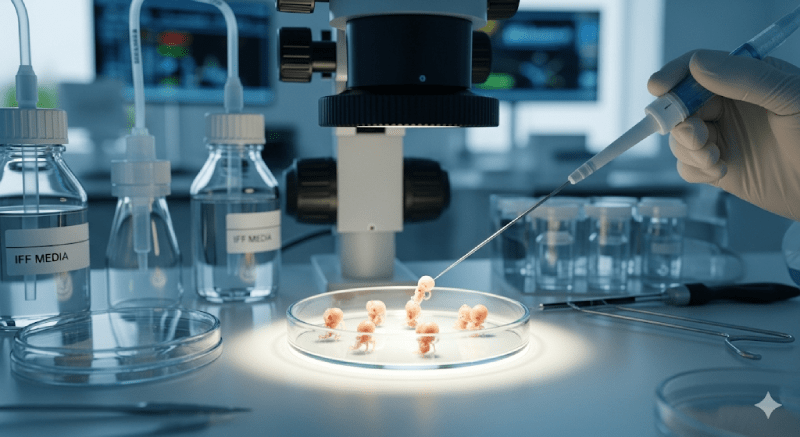
What are the Side Effects of IVF Treatment?
The most common side effects of IVF treatment include mild bruising or pain at the injection site, abdominal bloating and tenderness, headaches, mild cramping, and emotional fluctuations. A rare but serious side effect is Ovarian Hyperstimulation Syndrome (OHSS), which can occur as a result of overstimulation of the ovaries. This condition can manifest with symptoms such as abdominal pain, nausea, and weight gain and requires close medical monitoring.
How Many Embryos Should be Transferred at Once?
The number of embryos to be transferred is determined based on factors such as the couple’s age, the number of previous attempts, and embryo quality. To reduce the risks associated with multiple pregnancies (twins, triplets) for both the mother and the babies, a single embryo transfer (SET) is often recommended. Legal regulations also often mandate single embryo transfers under specific conditions. This approach ensures a healthier pregnancy.
When Do Pregnancy Symptoms Start After IVF?
The first 1-2 weeks after embryo transfer are known as the “two-week wait” and can be very stressful. During this time, some women may experience symptoms similar to those of natural pregnancy, such as breast tenderness, mild cramping, fatigue, or light spotting. However, these symptoms can also be a result of the hormonal medications used and are not a definitive sign of pregnancy. A blood test (beta-hCG) must be performed for a definitive result.
When Should the Blood Test (Beta-hCG) be Done?
To definitively determine if pregnancy has occurred after embryo transfer, a beta-hCG blood test is performed on the day specified by the doctor, which is usually about 10-14 days after the transfer. This test measures the presence and level of the beta-hCG pregnancy hormone in the blood. At this stage, urine tests may not be reliable enough and can give false results due to the medications used.
Is the Pregnancy Process Different for Women Who Gave Birth via IVF?
Pregnancies achieved through IVF follow a similar course to those conceived naturally. However, in IVF pregnancies, certain risks may increase due to underlying infertility causes or factors such as age. For this reason, IVF pregnancies are often monitored more closely. The doctor may apply additional tests or monitoring methods if deemed necessary.
What is the Difference Between IVF and IUI?
IUI (Intrauterine Insemination) and IVF are different treatment methods. In IUI, specially prepared sperm are directly injected into the woman’s uterus during her ovulation period. This procedure aims for fertilization to occur naturally inside the body. In IVF, fertilization is done in a laboratory setting. IUI is used as a less invasive initial treatment for conditions like mild male infertility or unexplained infertility, while IVF is preferred for more severe infertility issues.
What are the Legal Regulations Regarding IVF Treatment?
In Turkey, IVF treatment is strictly regulated by directives issued by the Ministry of Health. These regulations absolutely prohibit donation procedures (sperm, egg, or embryo donation). Treatment can only be applied to married couples, and it is mandatory for the egg and sperm cells used to be from the couple themselves. Furthermore, couples applying for treatment must provide their marriage certificate.
Is There an Age Limit for IVF?
In Turkey, there is generally a 42-year age limit for government-supported IVF treatments. However, in private clinics, this limit can be flexible if the patient’s health status and ovarian reserve are suitable. The age limit is directly related to the fact that the number and quality of eggs decrease as women get older. This situation leads to a decline in IVF success rates in women aged 40 and over.
How Should Nutrition be During IVF Treatment?
A healthy and balanced diet during IVF treatment can help the body respond better to the treatment. It is recommended to consume foods rich in antioxidants, folic acid, B vitamins, iron, zinc, and omega-3 fatty acids. Avoiding processed foods, excessively sugary and caffeinated drinks, and completely quitting alcohol and smoking will positively affect the success of the treatment.
Can You Exercise During IVF?
Light-intensity exercises such as walking, yoga, or light aerobics can help reduce stress during the IVF treatment process. However, it is important to avoid high-intensity exercises that involve heavy lifting, running, jumping, or applying pressure to the abdominal area, especially before and after egg retrieval. Your doctor can determine the most suitable exercise plan for your personal situation.
Is IVF Treatment Stressful?
The IVF treatment process can be quite challenging, both physically and emotionally. Hormonal medications can affect mood, while uncertainties, waiting, and financial burdens can lead to stress. To manage this stress, methods such as breathing exercises, meditation, and yoga can be helpful. Open communication between couples and seeking support can also make the process more manageable.
What is the Psychological Aspect of IVF Treatment?
The treatment process can lead to a range of intense emotions for couples. Opposite feelings such as hope and disappointment, joy and sadness can be experienced simultaneously. Feelings of loneliness, guilt, or jealousy may also arise. To cope with this situation, seeking support from a psychologist or communicating with other couples who have similar experiences can help you feel psychologically stronger.
Does IVF Treatment Prevent Genetic Diseases?
The PGT (Preimplantation Genetic Testing) method used in IVF treatment allows embryos to be screened for genetic diseases before transfer to the uterus. This way, couples who are carriers of a known genetic disease in their family (e.g., Thalassemia, Cystic Fibrosis) can find out if the embryos are genetically healthy. The method increases the chance of a healthy pregnancy by preventing the transfer of embryos with genetic disorders.
Is IVF Treatment Covered by Insurance?
In Turkey, the Social Security Institution (SGK) can partially cover IVF treatment for couples who meet certain conditions (age, duration of marriage, number of attempts, issues with sperm or egg quality, etc.). This is contingent on the hospitals having an IVF center. The coverage of private insurance companies varies depending on the policy. It is important to review these conditions in detail before starting treatment.
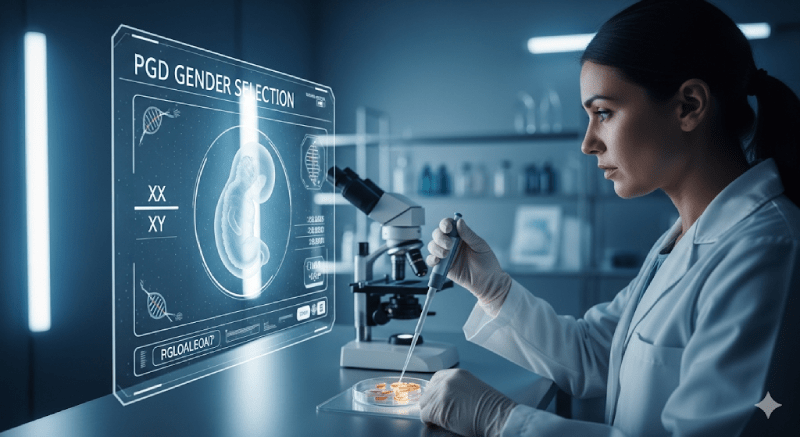
What Can Be Done for Repeated Unsuccessful IVF Attempts?
Repeated unsuccessful IVF attempts require a comprehensive evaluation. To solve this problem, the doctor may perform additional examinations such as an intrauterine examination (hysteroscopy), new laboratory techniques to improve embryo quality, or genetic tests. Depending on the cause of the failure, different approaches such as thickening the uterine lining or treatments related to the immune system may also be applied.
What is the Difference Between IVF and Egg Freezing?
While IVF aims for the fertilization and transfer of existing eggs, egg freezing is a method that allows women to store their eggs for future use. The egg freezing procedure is often chosen for social reasons or in situations that may affect fertility, such as cancer treatment, to prevent a decline in egg quality due to advancing age.
Is Sperm Donation Legal in Turkey?
No, both sperm and egg donation are not legal in Turkey. Turkish laws only allow the use of the couple’s own reproductive cells (eggs and sperm) in IVF treatment. This rule aims to protect the genetic link between the child and the parents. Although these procedures are legal in some other countries, they do not have a legal status in Turkey.
How Long Does Medication Use Continue After IVF?
After embryo transfer, progesterone supplements are used to support the successful implantation and continuation of the pregnancy. These medications typically continue until the placenta fully takes over its function, which is usually around the first 10-12 weeks of pregnancy. Medication use should be continued regularly until your doctor advises you to stop.
Does IVF Treatment Affect Future Pregnancies?
IVF treatment does not negatively affect the chance of future natural pregnancies. In fact, some couples may become pregnant naturally after treatment as their bodies’ hormonal balance returns to normal. This situation is more common in cases where the cause of infertility was mild hormonal imbalances or minor sperm issues. There is no increased risk for future pregnancies.
How Long Can Frozen Embryos Be Stored?
Thanks to modern vitrification technology, frozen embryos can theoretically be stored indefinitely. Embryos stored in liquid nitrogen at -196°C do not undergo biological deterioration over time. However, legal regulations in Turkey may limit the storage period of embryos to a specific number of years. This duration is generally determined based on the couple’s preference.
Can I Work After IVF Treatment?
A few days of rest are generally recommended after embryo transfer, but bed rest is not mandatory during this period. You can return to your normal daily routine and light activities. It is important to avoid heavy physical activity, strenuous work, or heavy lifting. Your doctor will recommend the most suitable rest and return-to-work plan for you, depending on the nature of your job.
Is There a Place for Acupuncture or Alternative Medicine in IVF Treatment?
Some studies suggest that alternative medicine methods like acupuncture can support the success of IVF treatment by reducing stress and increasing blood flow. However, these methods should never replace the main treatment. If they are to be used, they must be applied under the supervision of a doctor and as a complementary element that is consistent with your treatment plan. Unreliable alternative medicine methods can negatively affect the treatment.
Why is Embryo Quality Important?
Embryo quality is one of the most direct factors affecting the chance of pregnancy. High-quality embryos have a greater potential for implantation in the uterus and healthy development. Embryos are graded in the laboratory based on criteria such as cell division rate, cell count, and morphological features. The highest-graded embryos are prioritized for transfer.
When Should IVF Treatment Be Started?
The decision to start IVF treatment for couples diagnosed with infertility is made after a comprehensive evaluation. It is generally recommended for couples under 35 to seek expert help if pregnancy is not achieved within a year despite unprotected intercourse. For couples over 35 or those with a known infertility problem, this period is set at six months.
